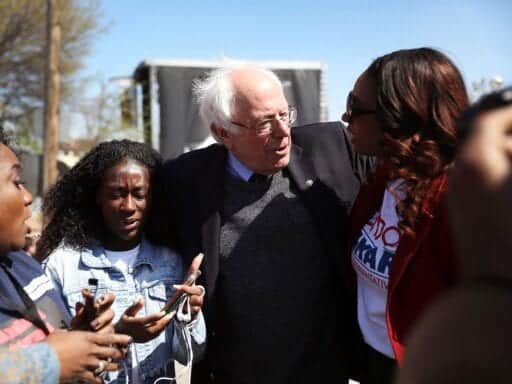Sanders said Wednesday that he’s staying in the race, but he’ll face an uphill battle without black voters.
Vermont Sen. Bernie Sanders once admitted that his 2016 campaign was “too white.” But despite his attempts to build a diverse coalition of supporters in 2020, it was clear on Tuesday that he hasn’t been able to bring black voters, a core constituency for the Democratic party, into the fold.
Former Vice President Joe Biden won big with black voters in Michigan, the state with the largest delegate trove on Tuesday, and in Missouri and Mississippi, according to CNN exit polls. Black voters supported Biden at rates of 66 percent in Michigan and 72 percent in Missouri — states where he reaped double-digit victories over Sanders. And in Mississippi, where black voters made up 69 percent of the electorate, they backed Biden over Sanders nearly 9 to 1.
Sanders has relied on young voters and Latinos of all age groups for his strong performances in states like Nevada and California. And on Wednesday afternoon, he announced he was staying in the race.
But the South Carolina primary on February 29 served as a wake-up call that Sanders’s outreach to the black community was failing: Biden won 61 percent of black Democratic primary voters there, who made up more than half of the state electorate, propelling his unexpected comeback. And on Super Tuesday, Biden won eight states where black voters made up a large share of the electorate.
/cdn.vox-cdn.com/uploads/chorus_asset/file/19785207/GettyImages_1202653322.jpg) Paul Ratje/AFP via Getty Images
Paul Ratje/AFP via Getty ImagesThe Sanders campaign has since scrambled to make a last-minute push among black voters. He began airing TV ads touting instances in which former President Barack Obama praised the senator and paid for spots on radio stations primarily catering to black communities in states that were set to vote on Tuesday. He also picked up an endorsement from the civil rights activist Rev. Jesse Jackson.
But his campaign openly admitted that he wasn’t performing as well as he needed to among black voters.
“We need to redouble our outreach effort,” Rep. Ro Khanna, co-chair of the campaign, told Politico. “We need to sit down with as many Congressional Black Caucus members as we can, whether they endorsed us or not. We need to be sitting down with the NAACP, with civil rights organizations.”
It’s not clear whether the Sanders campaign actually went through with that plan. (A spokesperson for the campaign did not immediately respond to requests for comment.) He was slated to deliver a speech in Flint, Michigan, on Sunday that would have made the case to black voters on why they should elect him over Biden, but he changed course at the last minute and just delivered a stump speech. The New York Times reported that his surrogates, many of whom are people of color, determined that it would be better for them to address the black community instead.
Given Sanders’s performance among black voters on Tuesday night, it’s clear that strategy didn’t work. And given that no Democrat has won the nomination without the support of a majority of black voters in three decades, this lack of support could well have cost him the election — for the second time.
Sanders also struggled to connect with black voters in 2016. He lost South Carolina that year, as well, when 86 percent of black voters chose Hillary Clinton over him. He consistently came under fire from black activists, in particular from Black Lives Matter, who criticized his lack of attention to criminal justice and racial issues. Even internally in his campaign, black staffers told Fusion at the time they weren’t prioritized.
Sanders has made efforts to hire more people of color this time around and integrate them across the campaign, beyond the community outreach typically seen in Democratic campaigns. He has, for example, brought in Nina Turner, a former state senator from Ohio, as a campaign co-chair, and she has proved a powerful surrogate for Sanders among black voters.
Some in his campaign have attributed Sanders’s lack of support among black voters overall to his difficulty connecting with older voters more generally. It’s true that Sanders narrowly won black voters under 30 in 2016, but they just didn’t vote in the kinds of large numbers he needed.
The same trend has held true this election cycle as young, black voters have again backed him overwhelmingly. But it appears that just wasn’t enough to insulate him from Biden’s sweeping wins on Tuesday.
Author: Nicole Narea
Read More



